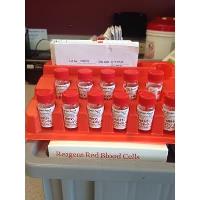Blood Assurance Collects Reagent Red Cells from Donors with Rare Blood Types

Blood Assurance, the regional non-profit blood center, has begun a reagent red cells (RRC) program with donors that have extremely rare blood types. Each week about 50 donors are selected for advanced blood typing. Some of the rarest units of blood come from minority donors. Besides knowing your blood type, for example O negative or A positive, over 300 other identifiers are in a red cell. These identifiers are called antigens. About 20 of the antigens are important to us in the blood center because of their association with transfusion reactions. Your unique pattern of antigens is called your “phenotype”.
Phenotype is important because if you are negative, or missing, a specific antigen and receive a blood transfusion that is positive or has the specific antigen, your body can view that specific antigen as foreign, or not belonging. Your body will then try to fight the foreign antigen by making an antibody to the specific antigen. Later if you receive a blood transfusion with that antigen again, you might have a transfusion reaction.
Donors get a specific phenotype when it is passed down from parent to child. Once a donor with a rare phenotype is identified, a Blood Assurance donor care specialist will talk to the donor about encouraging siblings and parents to become a part of the program.
When blood is collected for reagent red cells it is sent to a company that makes supplies used at blood banks and blood centers all over the country. These special supplies, called reagents, are used in testing to determine if the patient has a particular antibody. If the patient has an antibody then blood missing the corresponding antigen must be selected for transfusion. That way the body will not view the blood as foreign. Therefore, reagents are very important to help prevent transfusion reactions.
Blood Assurance serves 47 counties in a 5 state region, and is the sole provider of blood and blood components for over 70 healthcare facilities. More than 440 blood donors are needed every day in order to adequately supply the region served by Blood Assurance with lifesaving blood.
To be eligible to donate blood, you must be at least 17 years old (16 years old with parental consent), weigh 110 pounds or more and be in good health. The process usually takes about 30 minutes and includes a complimentary snack and t-shirt. Donors are asked to drink plenty of fluids - avoiding caffeine - and eat a meal that is rich in iron prior to donating.
For more information about the RRC program or donating blood, please call Blood Assurance at 1-800-962-0628 or go to www.BloodAssurance.org.
###
Pictured: Reagent red cells in Blood Assurance’s lab are used in patient antibody identification.